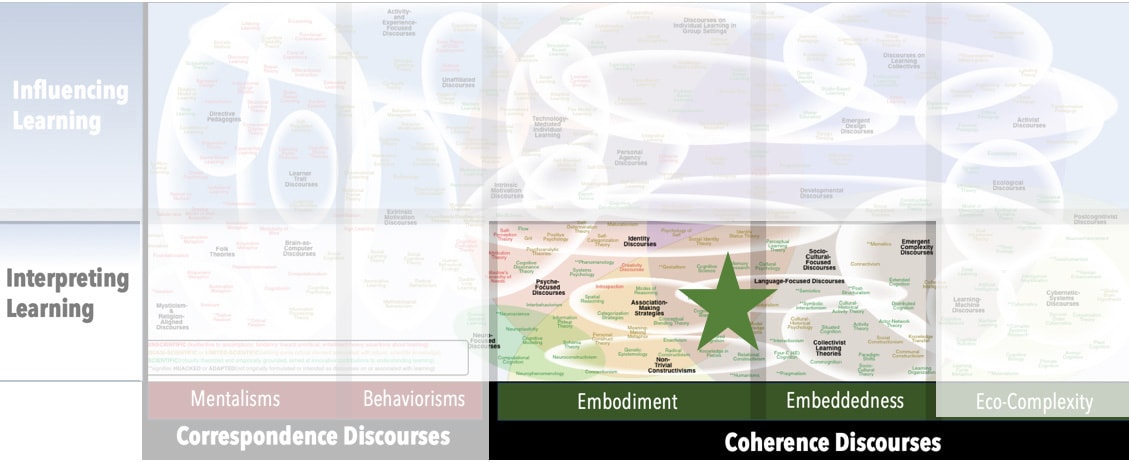Non-Trivial Constructivisms encompass a range of learning theories that invoke a “learning as construing” – vs. a “learning as constructing” – metaphor. The construing–constructing distinction is critical, and it became an issue because the French verb construire can be translated as either “to construe” (i.e., to integrate elements to make sense of) or “to construct” (i.e., to build something).
Learn More...Deep vs. Surface Learning highlights a divergence of opinion around what it means to know something. Deep Learning is associated with intrinsically motivated forms of engagement, characterized by making meaningful connections between new and previous understandings. Surface Learning tends to be associated with extrinsic motivations and is focused on the memorization and recall of information for formulaic responses.
Learn More...Embeddedness Discourses comprise perspectives on learning that refuse separations of self from other and individual from collective. Perceived boundaries among persons and peoples are understood as heuristic conveniences, as collective phenomena are recognized to unfold from and to be enfolded in individual phenomena. Phrased differently, collective forms are understood as learning bodies.
Learn More...Radical Constructivism focuses on personal knowing – that is, the ongoing, iterative dynamic by which individuals construe coherent sense from their personal perceptions and experiences. Concisely, learning is understood as a continuous process of revising concepts to maintain personal coherence in the face of new experiences/demands.
Learn More...Embodiment Discourses comprise perspectives on learning that refuse a separation of mental and physical. Mental and physical are understood as integrated and inseparable aspects of the body. Phrased differently, the body is not seen as something that a learner learns through, but as the learner. Correspondingly, behaviors are not seen as goals or indications of learning, but as integral elements of learning.
Learn More...Social Constructivism is a version of Constructivism in which particular attention is given to interactions with others. Those interactions are seen as integral to understanding personal construals and development. Social Constructivism shares Social Constructionism’s interest in jointly construed understandings of the world, but it is more focused on individual learning than in social constructs.
Learn More...Genetic Epistemology is a theory of the genesis/origins of knowing/epistemology, in which learning is framed as an adaptive process in which the principal criteria of personal truth are coherence among elements of understanding and their utility for making sense of one’s own experience, not match between internal, subjective interpretations and external, objective reality. Cognitive Developmentalism is a key element of Genetic Epistemology.
Learn More...Modes of Reasoning refers to a range of conscious processes used to derive or validate assertions based on established understandings. It is most commonly associated with logical deduction, but humans actually use a range of strategies to generate their truths, including Inductive Reasoning (Bottom-Up Logic), Abductive Reasoning, Analogical Reasoning, and Bounded Rationality. There is broad debate over the relative importance of each of type.
Learn More...Focus
Personal sense-making/understanding/knowing
Principal Metaphors
- Knowledge is … sum of collectively established construals/constructions
- Knowing is … evolving webs of coherent interpretations; fitness with circumstances
- Learner is … a meaning maker (individual)
- Learning is … construing*, connecting, interpreting, weaving
- Teaching is … occasioning, prompting, triggering, listening
Originated
2010s
Synopsis
Relational Constructivism is an elaboration of Genetic Epistemology that aims to incorporate the social and the material more explicitly into its account of personal sense-making. Relational Constructivism combines two theoretical influences – namely Embodiment Discourses’ focus on subjective construals based on one’s unique experiences and Embeddedness Discourses’ realization that subjective construals are not random but conditioned by one’s situation. Associated constructs include:
- Relational Reasoning (Relational Thinking) – the malleable and teachable ability recognize or construe meaningful pattens in unassociated bits of information. Relational Reasoning is usually invoked as a rather coarse, umbrella notion that – depending on the context – can include most Modes of Reasoning. It is associated with:
- Relational Knowledge – one’s well-connected, flexible, and available knowings (Highly similar: Relational Understanding, under Deep vs. Surface Learning.)
- Powerful Knowledge (Michael Young, 2014) – specialized, systematic knowledge that enables one’s capacities to predict, explain, and act strategically
Commentary
At first glance, it might appear that Relational Constructivism covers the same ground as Social Constructivism. While such an interpretation is not incorrect, the two theories take very different approaches. Social Constructivism combines theories uncritically, but Relational Constructivism returns to the philosophical roots of Non-Trivial Constructivisms to offer a well-integrated theory that maintains its focus on individual sense-making. That said, the theory has not been broadly embraced and thus has a limited research base.
Authors and/or Prominent Influences
Björn Kraus
Status as a Theory of Learning
Relational Constructivism is a theory of learning.
Status as a Theory of Teaching
Relational Constructivism is a not a theory of teaching.
Status as a Scientific Theory
Relational Constructivism does not have a substantial empirical basis, but it is sufficiently similar to Genetic Epistemology and Radical Constructivism to assert the theory is scientific.
Subdiscourses:
-
Powerful Knowledge
-
Relational Knowledge
-
Relational Reasoning (Relational Thinking)
Map Location

Please cite this article as:
Davis, B., & Francis, K. (2023). “Relational Constructivism” in Discourses on Learning in Education. https://learningdiscourses.com.
⇦ Back to Map
⇦ Back to List

